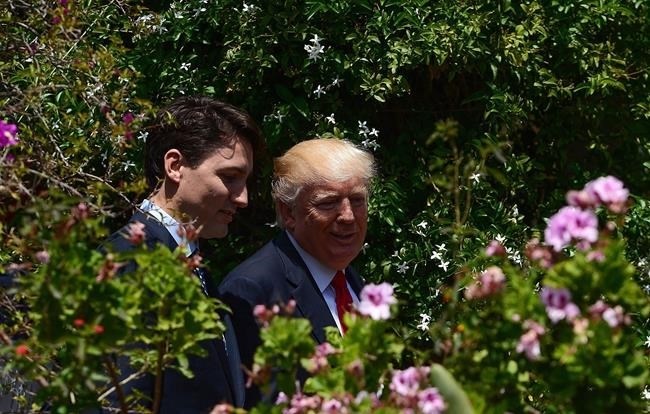
Prime Minister Justin Trudeau and U.S. President Donald Trump walk together during the G7 Summit in Taormina, Italy on Saturday, May 27, 2017. Donald Trump may have killed the 12-country Trans-Pacific Partnership, but experts say parts of the moribund Pacific Rim trade pact could well be resurrected in an upgraded North American Free Trade Agreement.
Image Credit: THE CANADIAN PRESS/Sean Kilpatrick
May 28, 2017 - 6:30 PM
OTTAWA - Donald Trump may have killed the 12-country Trans-Pacific Partnership, but experts say parts of the moribund Pacific Rim trade pact could well be resurrected in an upgraded North American Free Trade Agreement.
That's one way, they say, to help bring the outdated 23-year-old NAFTA up to the standards of modern era trade agreements — and to do so before talks become complicated by a presidential election in Mexico and U.S. congressional midterms.
Canada, Mexico and the U.S. were all originally TPP countries that viewed the new agreement as the primary means to upgrade a long-standing trade deal that was showing its age.
NAFTA was negotiated before the onset of the digital age and e-commerce, and before labour and the environmental protection provisions became regular features of trade deals.
The already completed TPP chapters on those issues could be modified or repurposed in a new NAFTA upgrade, said Andrea van Vugt, the vice president for North American affairs with the Business Council of Canada.
"You can use the template, make some adjustments and call it your own, and you've just accelerated the process," said van Vugt, who served as a chief of staff in the trade department during the Stephen Harper-era of Conservative rule.
"You can easily get this done within the time frame that they're working with, which is the Mexican election and the U.S. midterms."
Trump has pledged to scrap NAFTA if it can't be renegotiated to his satisfaction. But the political clock is ticking against a comprehensive retooling of NAFTA because Mexican elections are taking place next year, and U.S. midterms will soon follow.
That has the U.S. and Mexico and hoping for a deal by early 2018, but many other experts say that won't be possible because of the inherent complexities of trade negotiations. Canada, meanwhile, says it is ready to come to the negotiating table when called, but is showing no signs of being in any particular hurry.
Some experts argue that parts of the TPP can be incorporated in a way that could be palatable and face-saving for Trump. He has called the TPP a "disaster," and pulled the U.S. out of the deal on his first day in office, saying it was bad for American workers.
"It's politically risky for Trump to say that he's going to use the TPP as a model. I don't think he could do that explicitly," said Laura Macdonald, a Carleton University expert on Canada-Mexico relations.
"But I think behind the scenes they'll be looking at what all three countries had agreed to under the TPP. In some areas, that's going to work better than others."
Macdonald said progress could be made on updating e-commerce and other sectors that were overlooked by NAFTA, as well as upgrading labour protections into the treaty's main text from its side deal status.
"There were a lot of really good things in the Trans-Pacific Partnership that ... could easily be imported over," said David Messer, vice president of the Information Technology Association of Canada.
That includes provisions that affirm the unfettered flow of data over Internet, and the removal of visa restrictions to allow for greater mobility of high-tech workers across borders, he said.
Foreign Affairs Minister Chrystia Freeland has steered clear of mentioning TPP as a template for the NAFTA talks, but she recently singled out the Canada-EU free trade deal as a possible model.
"We have a great experience in CETA with modernizing labour and environmental chapters and bringing those up to 21st standards."
However, the TPP also includes provisions designed to resolve disputes involving workers' rights and the environment.
Scott Sinclair, senior researcher at the Canadian Centre for Policy Alternatives, said it is "inevitable that large parts of the TPP will resurface in a NAFTA renegotiation" but they fall far short of providing a speedy path to new agreement.
The Trump administration flatly rejects the TPP approach on rules on origin, and will work hard to "wring TPP-plus concessions from Canada and Mexico" in several other areas, he said.
That will mean fights over patent protection for medicines and for greater market access for dairy, as well as attempts by the U.S to weaken NAFTA's Chapter 19 countervailing and anti-dumping provisions, he said.
"If Canada balks at any of this, then turning to the TPP will not be a quick fix, but the start of a long and difficult negotiation."
News from © The Canadian Press, 2017